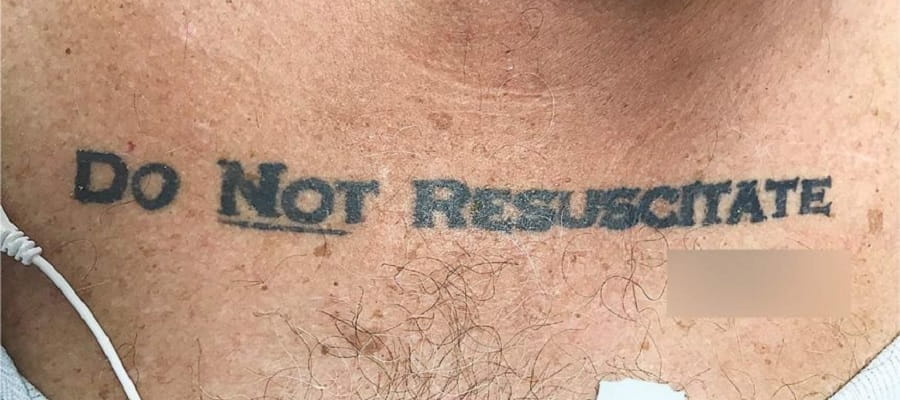
Image: New England Journal of Medicine
What would you do if you came across an unconscious person needing CPR, but they had a tattoo that said, ‘DO NOT RESUSCITATE’? Would you ignore the tattoo and continue treatment of the casualty? Would there be any legal ramifications of ignoring the tattoo? How would you know if the tattoo genuinely represents the person’s wishes, or if it’s just a joke?
These were questions faced by a team of doctors in the US when a patient was brought into a hospital emergency department. They discovered the words ‘DO NOT RESUSCITATE’ clearly tattooed across his chest, with the ‘Not’ underlined and what they presumed was his signature tattooed underneath the statement.
Faced with the dilemma of not knowing whether the tattoo was sincere, the doctors initially decided to administer some treatment while consulting with their hospital ethics team. The ethics team reviewed the case and advised the doctors to honour the tattoo, because it was reasonable to infer that it expressed the man’s wishes.
The man later died without being resuscitated, and it was discovered that he had, in fact, completed a form expressing his wishes which were consistent with the tattoo. The case sparked international discussion around the validity of these tattoos and whether they are legally binding.
So what would happen in Australia?
Hospitals in Australia typically don’t have an ethics team on call to review individual cases. Advance care planning does exist here; however, the laws differ between states and territories. Generally, treating doctors must be satisfied that the person was competent when they made the directive, that they understood the risks of refusing care and that it applies to the current situation – all virtually impossible for a first responder to determine when coming across an unconscious person in need of CPR.
While a Do Not Resuscitate tattoo could in fact represent a person’s wishes, without sighting documentation to verify this we cannot know for sure. Perhaps it was their wish at the time of getting the tattoo, but they have since changed their mind. Perhaps the tattoo was done in jest, or while under the influence. Additionally, the shorter version that simply states the initials ‘DNR’ presents even more ambiguity – it could stand for something else entirely.
First responders in Australia are trained that consent is implied if a casualty is unconscious. We cannot assume to know what the person would want at the time of needing care.
It is important to always follow your training and provide CPR if it is required.